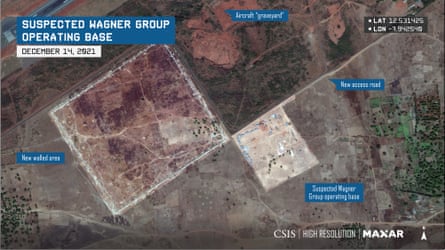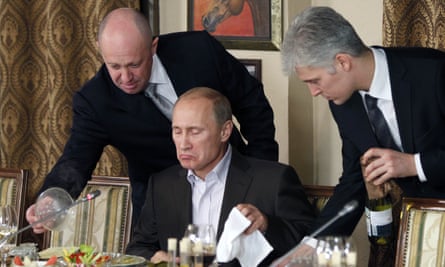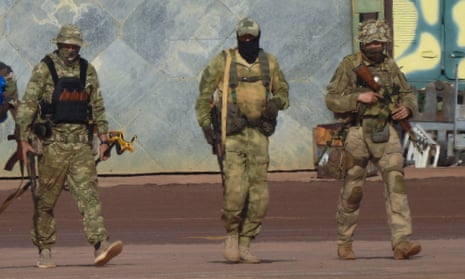Russian mercenaries in Africa have been linked to massacres in which several hundred civilians have died, raising new fears about the impact of Moscow’s intensifying interventions on the stability and security of countries across the continent.
Western officials have so far largely steered clear of naming the perpetrators of killings but witnesses, local community leaders, diplomats and local analysts blamed many of the deaths on fighters deployed by the Wagner Group, a network of private companies run by a close ally of Vladimir Putin.
The incidents have occurred in Mali, the strategic west African country where Wagner arrived last year after striking a deal with its new military rulers.
Internal Malian army documents seen by the Guardian reveal the presence of Wagner members - referred to as “Russian instructors” - on “mixed missions” with Malian soldiers and gendarmes during operations in which many civilians have been killed.
According to data compiled by the NGO Armed Conflict Location and Event Data Project (ACLED), as many as 456 civilians died in nine incidents involving Malian forces and Wagner between January and mid-April this year.
By far the most serious incident occurred in March when the Wagner Group is alleged to have been involved in a massacre in Moura, a village controlled by Islamist extremists, where between 350 and 380 men were killed over a four-day period.
Last week new allegations surfaced about two shootings in villages around the town of Hombori in the central Mopti region, following the death of one or possibly two Wagner mercenaries accompanying Malian troops on operations against Islamist militants.
Aid workers, experts and human rights campaigners said one attack came after a military patrol was ambushed on the outskirts of a village at about 9.30am on 19 April. According to an internal Malian military memo, a “Russian instructor” was injured by an improvised mine and died after being airlifted to the town of Sevare. A medical official in Sevare described the man as a Russian in his 30s.
Following the ambush, Malian soldiers fired on a crowded marketplace.
Mali’s military rulers, who took power in a coup in May last year, have said the Russians in the country are instructors and not deployed in combat roles. The army – sometimes know by the abbreviation FAMA – has denied a Russian was killed on 19 April and said the casualty was one of their own soldiers. It has also denied killing any civilians and said 18 terrorists had been “neutralised” during “vigorous” security operations.
Another internal memo described a clash on 23 April between militants and “a joint patrol of FAMA and Russian instructors” between the villages of Mondoro and Boni. “Provisional losses” amounted to “two dead – one FAMA and one Russian – and 10 wounded – six FAMA and four Russians”, said the memo, sent some hours after the incident. Details of “enemy losses” were “unavailable for the moment”.
Twelve other people – who may have been extremists – are also thought to have died.
Wagner has been active in a dozen countries across Africa, and it has been repeatedly accused of human rights abuses on the continent. On Tuesday a Human Rights Watch report alleged that forces in the Central African Republic identified as Russian appear to have killed and tortured civilians since 2019, echoing similar findings from a group of UN experts last year. The group has also taken part in the invasion of Ukraine and been linked to atrocities there.
British officials have expressed concerns at “a significant deterioration in the human rights situation” in Mali in recent months, which they noted coincided with the arrival of between 600 and 1,000 Wagner fighters. “Just as the presence of Russian mercenaries drove an increase in human rights violations and abuses in the Central African Republic in 2021, the same is now being seen in Mali,” one UK diplomat said.
The country’s new rulers hired Wagner for an estimated rate of $10m a month to be paid both in cash and through rights to extract minerals, experts believe.
The group set up a headquarters near the capital’s international airport in December, satellite photographs shared by the Center for Strategic and International Studies and flight records reveal, before moving out to forward operating bases across a swath of territory in the centre of Mali in January and February.


Community leaders, diplomats and officials have told the Guardian that Wagner fighters have been seen on joint patrols with Malian armed forces along the restive border with Burkina Faso and Niger, on the western frontier with Mauritania, and also in towns in northern Mali, including Timbuktu.
Pilots supplied by Wagner now fly Malian army helicopters and the group has also provided fighters who have led Malian forces on bigger operations, notably a major push against Islamist insurgents that began in late February.
In early March, more than 30 bodies were found burnt in the town of Niono in central Mali following operations by Malian forces supported by Wagner. Local witnesses accused both Malian and Russian fighters of killing civilians. Many victims had been tied and blindfolded, then shot, according to Human Rights Watch. Malian authorities denied the allegations.
Moura, where the alleged massacre of hundreds took place in March, is a village in an inaccessible swampy area of the floodplain of the Niger River which has been controlled for many years by militants from the al-Qaida-linked Group of Support for Islam and Muslims (GSIM). The extremists have imposed their rigorous and intolerant version of Sharia law on inhabitants, raised taxes and made local men follow their dress codes.
Amadou Barry, who lives in the neighbouring village, told the Guardian he was attending the weekly market in Moura on 27 March when helicopters suddenly appeared and troops disembarked. A small group of Islamist militants in the village shot at the soldiers and then fled on motorbikes.
“All of us started running in every direction, some into the houses. The Malian army then opened fire on people running, killing so many people,” Barry said.

Malian soldiers then marched hundreds of men from the village to a dry river bed nearby for interrogation. The men were held there with little food or water for four days, while soldiers periodically led groups of captives away to be killed, Barry and other witnesses said.
Some villagers were released after their fingers and shoulders were inspected for signs that they had fired guns, but all men from the Peuhl ethnic minority were detained, Barry said.
The GSIM and other extremist Islamist factions have sought to recruit among the pastoralist Peuhl by exploiting grievances with the government and other ethnic groups. According to survivors, those killed in Moura were all from the Peuhl community.
Héni Nsaibia, senior researcher at ACLED, said between 60 and 100 of those killed may have been unarmed Islamist militants, but the rest were civilians. Government forces found large quantities of weapons in Moura.
Several witnesses said the operation was led by white men speaking “a strange language” which some identified as Russian, though most of the soldiers who killed civilians were “Malian people”.
Ousmane Diallo, a researcher for Amnesty International in Mali, said testimony collected from survivors and witnesses confirmed that white soldiers landed in Moura on 27 March in helicopters and stayed for days.
“We know that Wagner are deployed in central Mali, they’ve been assisting operations in lifting and bringing more soldiers to their positions in the region. I think it’s pretty clear that it was Wagner that was conducting this operation,” Diallo said.

Nsaibia said his own exhaustive research among survivors led to a similar conclusion, while a west African diplomat in Mali said “inquiries into the events in Moura had confirmed that Wagner forces were working with Malian forces in central Mali”.
Human Rights Watch, the campaign group, called the incident “the worst single atrocity reported in Mali’s decade-long armed conflict”. The Malian army said it killed 203 militants during a military operation in Moura and denied reports of executions.
Russia vetoed a bid at the United Nations to commission an independent investigation into the massacre, and Mali has blocked efforts by the UN to send a team to Moura. Moscow’s deputy ambassador to the UN said Mali’s authorities did “not have a hidden agenda” and that claims of the involvement of Russian mercenaries in the massacre were part of “a sordid geopolitical game”.
The US and others have alleged that Wagner is funded by the powerful businessman Yevgeny Prigozhin, who is closely linked to Putin. Contacted by the Guardian this week Prigozhin denied any knowledge of the group and denied the reports of massacres.
“Any terrorist killed by the Malian army, the collective west tried to pass off as a civilian … As to the [alleged] atrocities, neither I, nor the men I know, nor the Malian army have committed them,” he said.
Prigozhin accused the Guardian of “fakes, outright lies and … falsification” and of trying to “spit in the face of me, the Russian patriots, and the Malian people”.
Last week, Islamist extremists from the GSIM claimed to have captured a fighter from Wagner in the Segou region in central Mali.
The GSIM statement said: “These murderous forces participated with the Malian army in an airdrop operation on a market in the village of Moura, where they confronted several mujahideen before … killing hundreds of innocent civilians.”
Analysts believe the Wagner operative was probably captured in February. Deaths of “three or four” Wagner operatives had been “more or less” confirmed but total casualties were likely to be higher, said Nsaibia.
Islamist militant groups were also responsible for killing large numbers of civilians in indiscriminate attacks and many other human rights abuses, officials and campaigners said. Several attacks by Islamic State in the Greater Sahara around Menaka and in the south near Gao last month led to the deaths of at least 40 civilians and displacement of thousands.
The alleged capture of one of its fighters showed how deeply Wagner had become involved in the conflict in Mali, said Jared Thompson, a research associate at the Center for Strategic and International Studies. “They are now a very direct conflict actor that has skin in the game.”
A correspondent in Bamako contributed to this report








